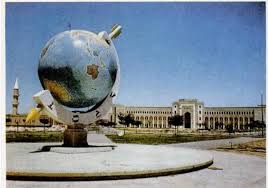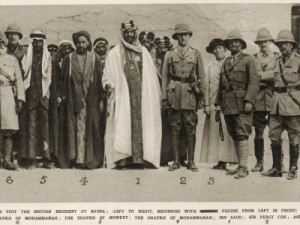“But Saudi Arabia and the other Sunni Arab states should not be so singularly obsessed with the danger posed by Shi’ite-led Iran. These states have other internal problems and economic worries to deal with, especially bulging youth populations and the lack of avenues for political expression. The House of Saud is facing a challenge from the militant group Islamic State, which carried out a suicide bombing last week that killed at least 21 worshippers at a Shi’ite mosque in the kingdom’s Eastern Province. The Saudi regime must also cope with the long-term consequences of declining revenue due to lower oil prices………….”
Saudi Arabia has taken a couple of big gambles in recent months. The ruling family has taken some questionable advice on how to slam its regional opponents and rivals, mainly Iran and Iraq, and tighten its alliance on the Arab side of the Persian Gulf. Both are extremely risky:
- The Saudis have uncharacteristically allowed oil prices to plunge, thus aiming new economic blows at an Iranian regime that is already enduring a tough Western economic blockade. Along the way they also aimed a few left hooks to Mr. Putin’s Russia, a major supporter of Syria and Iran. (Unlike the Western powers, Mr. Putin has not yet threatened to put ‘boots on the ground’ in Syria or to keep a military option on the legendary table).
The Saudis also struck at the very-cost-sensitive American and Canadian shale oil industry, now a major rival in the market.
- In addition to “lowering” oil revenues, the kingdom has also started to bet high in a regional poker game. It started an expensive bombing war against the poorest Arab country, Yemen (now mostly controlled by Houthis and the Army). A costly and intensive bombing war that has shown no results in more than two months except destruction of Yemen’s fragile infrastructure. And plant cluster bombs across that country.
- In addition to the high cost of bribing the rulers of Sudan and Jordan and Morocco and Senegal to join their Yemen military adventure.
- The new King also immediately raised salaries of all military and security employees and granted every public servant (most working Saudis) and student a two-month extra salary bonus.
- The total cost of all that is almost certain to exceed one hundred billion dollars: by how much depends on the duration and intensity of their new war. And how much the newly promoted princes (MBN, MBS, XYZ…..) skim off the military expenditures and other major contracts. Meanwhile oil revenues are down, creating a risky imbalance and a drainage on foreign reserves.
- Contrary to what the Saudis expected, the Houthis and their army allies have expanded their territory since the air campaign in Yemen started. They have now started to attack inside the Saudi home territory, with a surprising degree of ease and impunity. Which is leading to more Saudi casualties, probably an unexpected consequence.
What makes all this riskier is that the new King Salman, in an un-Solomonic move, has started immediately to turn his country’s budget, which is essentially the ruling family budget, into a large deficit. In the process he is depleting his country’s foreign reserves.
The cash bonuses paid out are already eaten up by the inevitable higher prices. So far the war on Yemen looks set to drag on unsuccessfully, all the munitions and cluster bombs need to be replaced. The newly-promoted young princes try to get even richer while they can. Then they will all be back to the starting point……….
Their foreign reserves are still high. Maybe they can withstand it for a sustained period, maybe, but for how long and at what rate of depletion……..
Cheers
Mohammed Haider Ghuloum 
m.h.ghuloum@gmail.com




